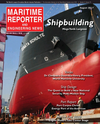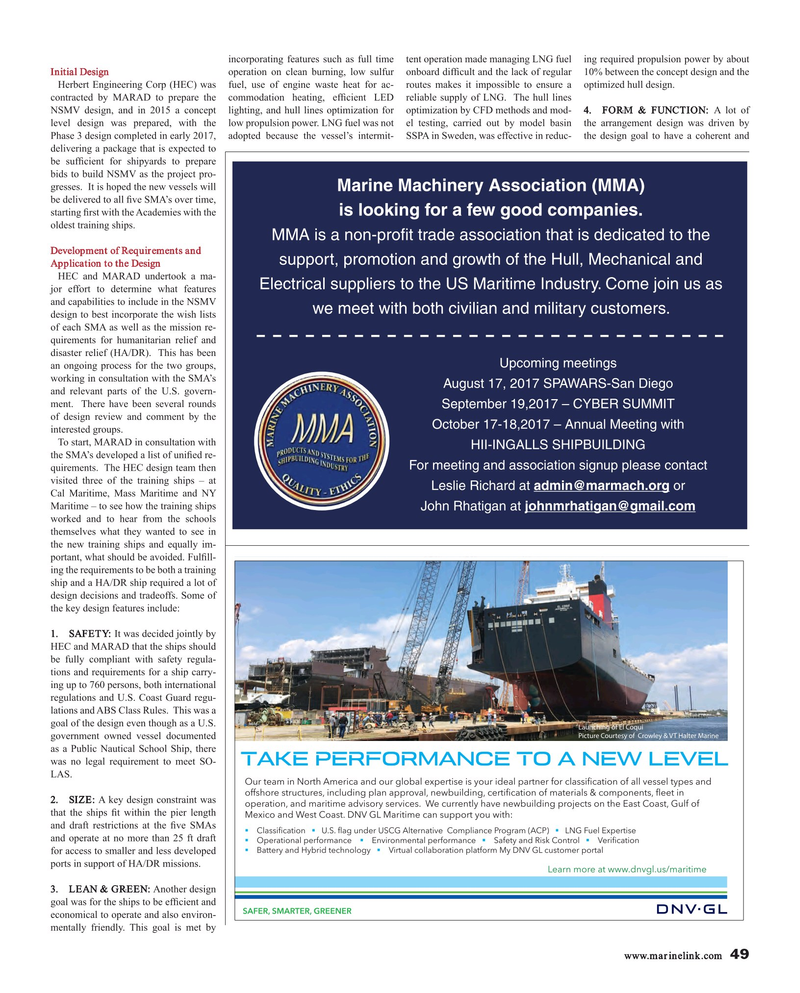
Page 49: of Maritime Reporter Magazine (August 2017)
The Shipyard Edition
Read this page in Pdf, Flash or Html5 edition of August 2017 Maritime Reporter Magazine
incorporating features such as full time tent operation made managing LNG fuel ing required propulsion power by about
Initial Design operation on clean burning, low sulfur onboard dif? cult and the lack of regular 10% between the concept design and the
Herbert Engineering Corp (HEC) was fuel, use of engine waste heat for ac- routes makes it impossible to ensure a optimized hull design. contracted by MARAD to prepare the commodation heating, ef? cient LED reliable supply of LNG. The hull lines
NSMV design, and in 2015 a concept lighting, and hull lines optimization for optimization by CFD methods and mod- 4. FORM & FUNCTION: A lot of level design was prepared, with the low propulsion power. LNG fuel was not el testing, carried out by model basin the arrangement design was driven by
Phase 3 design completed in early 2017, adopted because the vessel’s intermit- SSPA in Sweden, was effective in reduc- the design goal to have a coherent and delivering a package that is expected to be suf? cient for shipyards to prepare bids to build NSMV as the project pro- gresses. It is hoped the new vessels will
Marine Machinery Association (MMA) be delivered to all ? ve SMA’s over time, starting ? rst with the Academies with the is looking for a few good companies.
oldest training ships.
MMA is a non-pro? t trade association that is dedicated to the
Development of Requirements and support, promotion and growth of the Hull, Mechanical and
Application to the Design
HEC and MARAD undertook a ma-
Electrical suppliers to the US Maritime Industry. Come join us as jor effort to determine what features and capabilities to include in the NSMV we meet with both civilian and military customers.
design to best incorporate the wish lists of each SMA as well as the mission re- quirements for humanitarian relief and disaster relief (HA/DR). This has been
Upcoming meetings an ongoing process for the two groups, working in consultation with the SMA’s
August 17, 2017 SPAWARS-San Diego and relevant parts of the U.S. govern- ment. There have been several rounds
September 19,2017 – CYBER SUMMIT of design review and comment by the
October 17-18,2017 – Annual Meeting with interested groups.
To start, MARAD in consultation with
HII-INGALLS SHIPBUILDING the SMA’s developed a list of uni? ed re-
For meeting and association signup please contact quirements. The HEC design team then visited three of the training ships – at
Leslie Richard at [email protected] or
Cal Maritime, Mass Maritime and NY
Maritime – to see how the training ships
John Rhatigan at [email protected] worked and to hear from the schools themselves what they wanted to see in the new training ships and equally im- portant, what should be avoided. Ful? ll- ing the requirements to be both a training ship and a HA/DR ship required a lot of design decisions and tradeoffs. Some of the key design features include: 1. SAFETY: It was decided jointly by
HEC and MARAD that the ships should be fully compliant with safety regula- tions and requirements for a ship carry- ing up to 760 persons, both international regulations and U.S. Coast Guard regu- lations and ABS Class Rules. This was a goal of the design even though as a U.S.
Launching of El Coqui
Picture Courtesy of Crowley & VT Halter Marine government owned vessel documented as a Public Nautical School Ship, there was no legal requirement to meet SO-
TAKE PERFORMANCE TO A NEW LEVEL
LAS. 2XUWHDPLQ1RUWK$PHULFDDQGRXUJOREDOH[SHUWLVHLV\RXULGHDOSDUWQHUIRUFODVVLgFDWLRQRIDOOYHVVHOW\SHVDQG
RIIVKRUHVWUXFWXUHVLQFOXGLQJSODQDSSURYDOQHZEXLOGLQJFHUWLgFDWLRQRIPDWHULDOV FRPSRQHQWVGHHWLQ 2. SIZE: A key design constraint was operation, and maritime advisory services. We currently have newbuilding projects on the East Coast, Gulf of that the ships ? t within the pier length
Mexico and West Coast. DNV GL Maritime can support you with: and draft restrictions at the ? ve SMAs ?&ODVVLgFDWLRQ? 86GDJXQGHU86&*$OWHUQDWLYH&RPSOLDQFH3URJUDP$&3? LNG Fuel Expertise and operate at no more than 25 ft draft ?Operational performance ?Environmental performance ?Safety and Risk Control ?9HULgFDWLRQ ?Battery and Hybrid technology ?Virtual collaboration platform My DNV GL customer portal for access to smaller and less developed ports in support of HA/DR missions.
Learn more at www.dnvgl.us/maritime
Learn more at 3. LEAN & GREEN: Another design goal was for the ships to be ef? cient and
SAFER, SMARTER, GREENER economical to operate and also environ- mentally friendly. This goal is met by www.marinelink.com 49
MR #8 (42-49).indd 49 MR #8 (42-49).indd 49 8/8/2017 3:06:29 PM8/8/2017 3:06:29 PM

 48
48

 50
50
